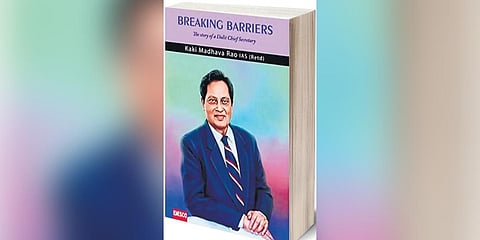

HYDERABAD: Madhav Rao’s “Breaking Barriers – The story of a Dalit Chief Secretary”, published by Emesco Books, is a powerful book that must be read by all those interested to know about how policies are made and the functioning of governments. Spread over 14 chapters, Madhav Rao begins his life story from the home of an agricultural farm hand to the bungalow of the state’s chief secretary, the highest office a bureaucrat can aspire to reach in his career.
The tone of the book is set in the first three chapters that describes his early years – starting with his struggles against a tradition where the son follows the father with no right of choice or agency. In this case, the battle was between the desire of Madhav Rao’s mother to educate her son to break free from the shackles of daily subsistence and that of his father who was determined to ensure that his son follow his example of being the best farm hand around in the area.
In recalling his early days, Madhav Rao touches upon some significant events that impacted him – the thrashing he got from his father as a seven year old for doing no wrong that made him fall silent but not condone that act of injustice or, again, living a frugal life in dirty, insanitary conditions and often an empty stomach, to pursue his ambition to study that taught him the values of self discipline, self control and single mindedness.
So while these early years made the man he became, imbibing the dominant traits of his parents – from his mother the passionate sense of fairness and justice and from his father belief in oneself to achieve the goal set by sheer grit and hard work – his years as a senior civil servant, tests his stubborn commitment to his values and beliefs. Besides understanding the events, people and the circumstances that shaped and defined him as a person, the book is a valuable reading for getting a first hand account and a deep understanding of the social, political and economic transformation that the State was undergoing.
The chapters traversing Madhav Rao’s journey as a Collector of Warangal district to becoming the states chief secretary are fascinating and compelling. Madhav Rao was noticed and marked when as the district collector he stood by the poor and the weak against powerful political forces, resulting in his transfer, to what was then considered a posting of “less consequence”. But there again he continued his battle of working for the rights and the welfare of the most marginalized social groups - the scheduled castes and tribes - in close comradeship with an iconic officer, Shri S R Sankaran, enforcing the rule of the law that often meant disrupting the status quo of caste hierarchies - for example, in implementing the banning of bonded labour and freeing them from the tight grip of the local landlords, who have, for generations, thrived on such social exploitation.
Madhav Rao worked in politically sensitive posts of State’s Finance Secretary, Secretary in the CM’s office and later as the state’s Chief Secretary. This phase is the most riveting of all as one gets to understand the dynamics of policy making, agenda setting, the role of the bureaucracy and the tensions that a bureaucrat goes through while navigating a toxic environment while holding onto and not compromising with one’s principles. The chapters covering the periods when he worked as the Principal Secretary to N Jananardhan Reddy and Chief Secretary under Chandra Babu Naidu provide rich insights into the minds and thinking of the two leaders. These chapters can also serve as good case studies for how IAS officers can solve problems, address tricky issues, and the extent to which one can accommodate political compulsions, without necessarily having to compromise on integrity, principlesor the Constitution.
What makes this autobiography remarkable is that despite the title stating it is the story of a ‘dalit’ chief secretary, Madhav Rao never once relates his story with a view to seek the readers sympathy or pity. In fact, Madhav Rao earned every achievement, not on the basis of his caste, but his sheer merit, competence and most importantly a supportive, collaborative style of working with colleagues earning him respect, friends and much admiration. Today he is an icon for junior officers. This book is invaluable reading for them to understand that policy environments have always been hard and the effectivity of an officer is when he is accessible and helpful.
What is required of IAS officers is courage and belief to live by the constitutional values that Ambedkar gave India to which they are bound, regardless of consequences.
And who else can give that message better than Madhav Rao.